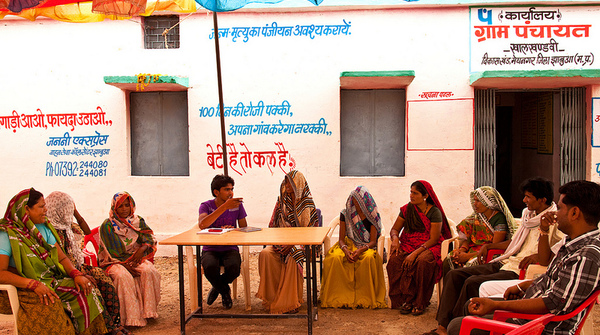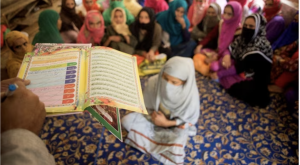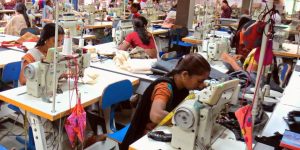Why the UP Population Bill Harms Women And Marginalised Populations

On July 11th, Chief Minister of Uttar Pradesh, Yogi Adityanath, announced the Uttar Pradesh Population (Control, Stabilisation and Welfare) Bill as part of the state’s population policy for 2021-2030. The policy is aimed at bringing down the state’s Total Fertility Rate (TFR) among women to 2.1 by 2026 and 1.9 by 2030 from the current 2.7, the CM said, while making the announcement.
Among the many provisions, the bill seeks to disqualify any person having more than two children, from contesting Panchayat and other local body elections and applying for state government jobs. It also bars those violating the two child norm from receiving subsidies and benefits from government welfare schemes and disqualifies public servants from any promotions or increments.
On the other hand, it incentivises public servants following the two child norm by offering several incentives such as tax exemptions, concessions in water and electricity bills, subsidy to buy property and a 3% increase in the employer‘s contribution fund under national pension. Additionally, the bill also rewards public servants with a single child with free healthcare, insurance and preference in India’s premier educational institutions including Indian Institute of Management, All India Institute for Medical Sciences among others.
Population control measures, especially those involving incentives and disincentives, driven by demographic targets violate the Programme of Action of the International Conference on Population and Development (UN 1994) (ICPD POA), to which India is a signatory, and Government of India’s National Population Policy( NPP) (2000). Both the ICPD POA and NPP hold that individuals’ informed choice and consent along with a focus on their reproductive health rights should be at the centre of government’s family planning goals.
Apart from violating reproductive health rights, the two-child norm violates multiple constitutional provisions, such as Article 14 and 15 that ensure equality before law, Article 39A and Article 46 that guarantee the rights of disabled and marginalised sections of the society and Article 51(A) that discourage practices that are derogatory to the dignity of women.
Experts expressed apprehensions about the Muslim community being the targets of the proposed bill. “Even though it does not specifically mention Muslims, it can’t be doubted that the objective is to keep communal hatred on the boil, a tested and tried election winning formula”, writes S.Y Quraishi, former Chief Election Commissioner and author of The Population Myth: Islam, Family Planning and Politics in India. Dispelling the myth of Muslims outnumbering Hindus, he argues that socio-economic indicators such as poverty, employment, education level, age of marriage, infrastructure and service delivery determine the adoption of family planning initiatives.
The UP bill, while harmful on many counts, increases the vulnerability of women, their political participation and exercise of choice and agency. Additionally, it is harmful to people living with disabilities, as it erases their personhood and invisibilises an already invisible population
Restricted Political Participation For Women And Marginalised Communities
Before Uttar Pradesh, the two-child norm had been implemented in at least 12 states at some point in time, as a criteria for eligibility to contest local body elections. These are Rajasthan, Haryana, Odisha, Madhya Pradesh, Himachal Pradesh, Maharashtra, Andhra Pradesh, Uttarakhand, Chhattisgarh, Gujarat, Bihar and Telangana.
Studies by Government of India (2009) and researchers like Nirmala Buch (2005) have shown that the two-child norm has led to a high proportion of disqualification among women, Scheduled Caste (SC) and Scheduled Tribe (ST) and Other Backward Classes (OBC) elected representatives at the local level. Both studies reveal that 80% of disqualified candidates belonged to SC,ST and OBC communities. Women constituted 41% of disqualification cases of elected representatives across 6 states in the study conducted by Buch, a former civil servant and secretary at the Ministry of Rural Development and the former Chief Secretary of Madhya Pradesh.
The 73rd constitutional amendment was a landmark amendment in ensuring women’s political participation in local governance. By reserving one third of seats for women, SC and ST candidates, it guaranteed their entry into local governance and a chance to exercise their political rights. Disqualifications of grounds on having more than two children violates their political agency.
“The two-child norm precisely takes away what the 73rd amendment sought to give. Without reservation women stood no chance to be a part of the local governance system”, says Litali Das, an independent consultant working on gender issues and development.
46% of elected representatives in Panchayati Raj institutions across India are women, according to the latest government data. There are 304538 elected women representatives – 33.3% of the total elected representatives– in Uttar Pradesh. The proportion of women elected representatives will see a reduction if the UP Population Bill, is passed
Buch’s and GoI’s studies show that long-drawn court cases, enquiries, and the dilemma of having to choose between the desire for a son and continuing to hold political office are factors that discourage women and marginalised communities from contesting panchayat elections in states where the two child norm is in place.
In Javed and Others vs State Of Haryana, the Supreme Court on 30 July, 2003, rejected the contention that the two-child norm would hurt women as they would be forced to bear a child by their husbands thereby face disqualification. “We do not think that, with the awareness that is arising in Indian women folk, they are so helpless as to be compelled to bear a third child, even though they do not wish to do so”, ruled the court.
In 2019, Subhrenti Pradhan, the chairperson of the Daringibadi Panchayat Samiti in the tribal majority Kandhamal district was disqualified by the district court after the petitioner alleged that Pradhan had hidden the number of children she had, to avoid disqualification.
“The assumption – on which the two-child norm has been formulated and even upheld – that Elected Women Representatives (EWRs) or women, in general, have a say in or control over the number of children that they will bear, is a fallacy. Instead, family pressure is the major deciding factor,” said Radha Khan, an independent consultant working in the field of gender, governance and social inclusion.
The two child norm also inverts the very essence of local governance institutions- greater control over resources and decision making for women and historically marginalised populations. Panchayats are custodians of village commons and funds under various schemes for the welfare of the populations in rural areas.
“Data show that the SC/ST and members of other marginalised communities within the rural population are likely to have more children. With policies like these, they will not get to have a say in the deployment of these funds. Subsequently their access to and control over resources will be disproportionately limited”, adds Das.
Experts also contend that the cut-off date in the two-child norm seeks to particularly target the youth planning to start their families.The policy further alienates young people from the local governance system.
“What kind of a grassroots democracy are we propagating or facilitating for the country’s youth?”, asks Das.
Increasing Women’s Vulnerability
Aspiring contestants have used a plethora of strategies to circumvent the two child norm in states where it has been implemented. These include denying the birth of a child, hiding children, not registering births, tampering with documents or sourcing fake ones, and giving away children for adoption, said Litali Das, who has found evidence of these practices in her work with EWRs in Odisha. “There was a sudden increase in the number of abortions around the time of PRI elections”, she said.
Many of these strategies that men resort to, in a bid to hold on to political power, are anti-women.
“Owing to the son-preference culture in India, desertion and abandonment of wife and children, pre-natal sex determination, sex-selective abortions that harm health of women, female foeticide, and female infanticide are common in states where the two-child norm has been included in the Panchayati Raj Act,” said Das.
The result of such practices is reflected in the skewed sex ratio in these states, especially in the case of Haryana. In Uttar Pradesh, the sex ratio is already skewed with 880 per 1000 males according to the latest data from the Sample Registration System (SRS).
“In patriarchal societies like ours, the entire burden of population control is shouldered by women. We’ve seen camps where women were herded like cattle and sterilised in poor and unhygienic conditions; exposing them to greater health risks”, said Khan.
Buch’s research from six states demonstrates that individuals knowingly violate the two-child norm to opt for a male child. Evidence also shows that some elected representatives chose to have a third or fourth child over retaining their political post.
Radha, an SC woman elected as a panch in Odisha in 1997, terminated her fourth pregnancy, after the sex determination test revealed the foetus to be female. Her next pregnancy determined a male child, which she retained, and subsequently faced disqualification.
The Indian states of Madhya Pradesh, Himachal Pradesh, Chhattisgarh, and Haryana have since revoked the two-child policy.
Erasing The Personhood Of People with Disabilities
Section 15 of the proposed bill states that disabled children born to a couple will not be considered as violating the two child norm if they chose to have a third child. Disability rights activists believe that this provision, while erasing the personhood of people with disabilities, reflects an ableist outlook of the government with far reaching ramifications.
“The Bill is almost declaring that a disabled individual will not be counted as a person, robbing them of their legal personhood and citizenship,” said Nidhi Goyal, Founder and Executive Director, Rising Flame – an organisation that works for recognition, protection, and promotion of human rights of People with Disabilities (PWDs).
Even as people living with disability and their many intersectionalities are invisibilised during policy making processes, the UP bill cements an already existing hierarchy where non-disabled persons are valued more than persons with disabilities, says Goyal. This, she says, stems from a productivity-centric capitalistic assumption that considers disabled persons unproductive and a burden to the society.
The language of the bill where ‘suffering’ is used to describe disability ‘highlights an underlying problem of our society – we still see disability as a suffering and an anomaly, and not as diversity’, says Goyal. This leads to an under investment on the disabled child’s education, care, support and leads to higher levels of abuse.
Seen through a gendered lens, the bill will also increase the alienation of disabled women.
“Apart from the notion that disabled women cannot be caregivers and, therefore, good mothers, there is a perception that disability perpetuates disability,” Goyal added.
“There is historical evidence that any kind of population control ends up translating into coercion on women’s bodies. The abuse, the pressure around reproduction, the silent sex determination or investigation into possible foetal anomaly will take place. What means are used for what ends and at the cost of who? The cost is huge”, said Goyal.
Our Newsletter
Subscribe to Our Newsletter
We believe everyone deserves equal access to accurate news. Support from our readers enables us to keep our journalism open and free for everyone, all over the world.



